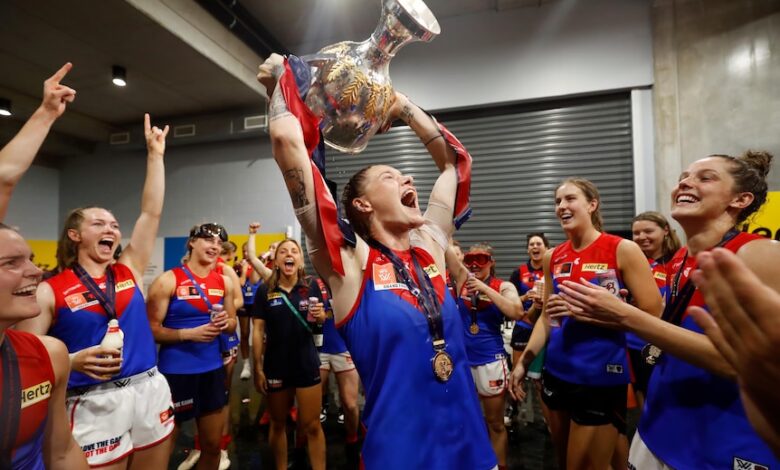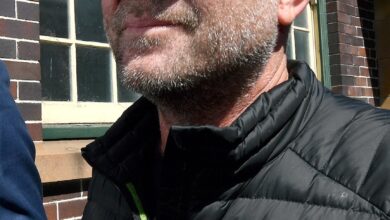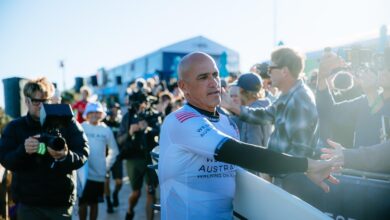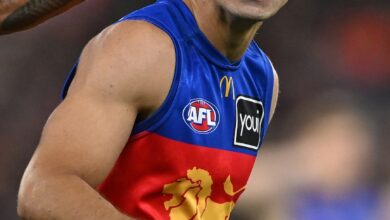Most sportswomen expertise gendered on-line hurt, affecting wellbeing, analysis says

[ad_1]
A research by researchers from Deakin College has discovered that an amazing majority of elite sportswomen (9 in 10) have skilled some type of gendered on-line hurt, together with 87 per cent up to now 12 months.
And whereas the point out of trolling and girls in sport is usually related to high-profile athletes like Tayla Harris, outcomes confirmed that ladies of all profiles, and throughout all sports activities, have been affected.
Felicity Goodwin, who performed elite-level rugby union, says she skilled each blatant sexism, and extra insidious makes an attempt to make her really feel unwelcome.
“There have been the stereotypical feedback of ‘get again within the kitchen and make me a sandwich,” she says.
“However there have been additionally ones like ‘oh, so that you just like the Wallabies? Inform me the highest strive scorers for the previous few seasons, or the final three winners of the John Eales medal.’ I can do this — however why ought to I’ve to?
“The issue was simply the truth that I used to be feminine, and I had the nerve to be in that area.”
The Deakin research surveyed 138 skilled and semi-professional athletes from 32 sports activities, with 85 per cent saying their wellbeing had been affected by on-line hurt, whereas two in three felt unsafe.
The most typical examples of gendered on-line hurt have been private insults (81 per cent), hate speech (62 per cent), makes an attempt to embarrass (60 per cent) and each normal and sexual harassment (50 per cent and 39 per cent respectively).
One in 4 sportswomen additionally skilled homophobic abuse, and one in 5 racist abuse.
Goodwin, who final 12 months labored as an assistant coach on the Queensland Reds, was a type of focused by homophobia.
“Straight-identifying teammates copped it too, however extra typically with feedback round their look, like ‘what’s a fairly lady such as you doing in a sport like this?’
“We have been most likely a simple goal, enjoying ladies’s workforce sports activities. Particularly if you happen to have a look at rugby, it is traditionally a personal boys’ college sport, and there is very a lot an ‘outdated boys’ mentality to it.”
Ladies in sport caught in ‘vicious cycle’
Affiliate professor Kim Toffoletti, one of many report’s co-authors, stated the research explored the impacts of not simply being the direct goal of abuse, however witnessing it.
“Should you’re an athlete, and also you’re seeing ladies in high-profile positions being abused in these sorts of areas, the message it sends is that if you happen to achieve your sport, you may be trolled, harassed, judged and shamed,” she stated.
“It is a fairly highly effective manner of regulating ladies and sending a message to them about getting again of their place.”
As Dr Toffoletti defined it, sportswomen are caught in a catch-22 state of affairs with regards to sustaining a web-based presence.
Greater than 97 per cent of athletes reported that it was essential for them to take care of a social media presence, together with 69 per cent who stated they wanted an account for work, sponsorship or their skilled profile.
“They recognised a vicious cycle the place their sports activities weren’t getting sufficient visibility, however once they tried to place themselves on the market — to advertise themselves and their actions — they obtained abuse,” she stated.
Making issues worse, 81 per cent stated that experiencing on-line hurt in flip affected their financial alternatives.
One in 10 additionally felt it essential to shut their social media accounts, whereas 64 per cent stated they modified their on-line behaviour in a roundabout way, together with posting much less, or avoiding ‘heavy’ or politically-charged subjects.
“Ladies felt compelled to current a palatable, nice on-line presence that did not disrupt or problem the established order,” Dr Toffoletti stated.
Onus to unravel on-line hurt placed on athletes, not offenders
In line with Goodwin, the difficulty of on-line hurt was compounded by sporting organisations and golf equipment placing the onus onto athletes to unravel the issue.
“We now have schooling periods the place we speak about expectations on gamers and their position in issues, like, ‘do not exit and antagonise individuals; do not give them something and do not reply to them,'” she stated.
“However the factor is it isn’t only a me downside. I am solely replying to issues that have been despatched to me.”
Lead researcher Dr Caitlin McGrane stated this was a typical theme in interviews with athletes, who have been persistently advised to ‘block’ and ‘ignore’ offenders, and watch out about what they posted:
“It places the onus again on ladies to be defending themselves from the potential of harassment and hurt, slightly than stopping males from doing it within the first place,” she stated.
“Principally we’re asking ladies to shrink themselves down, to take up much less area, be much less seen and never promote themselves as a lot, simply in case.”
Athletes have been additionally repeatedly inspired to report abuse, however 80 per cent didn’t really feel safer after doing so.
Goodwin stated she reported a number of abusive posts on platforms like Fb, however was advised they didn’t go in opposition to group requirements.
“That was regardless of the actual fact the phrasing was slightly threatening and homophobic.”
It additionally repeatedly took weeks for her to obtain a response.
“So my perspective is, ‘what’s reporting going to do?'”
Athletes generally felt harmed by their very own golf equipment
The outcomes of the analysis likewise confirmed that over half of those that skilled gendered on-line hurt didn’t search assist for it.
Those that did overwhelmingly turned to family and friends or fellow athletes, slightly than their golf equipment, sporting organisations or participant unions.
“Among the athletes we spoke to felt that in the event that they raised it with their membership, they have been going to be seen as ‘mentally fragile’, as a complainer, or somebody who could not ‘hack’ it,” Dr Toffoletti stated.
Alarmingly, some athletes additionally felt harmed by their very own sporting golf equipment or organisations.
Respondents offered a wide range of examples of this, together with being excluded from group chats, misrepresented by their social media groups and missing autonomy over what was posted about them.
A few of these posts led to physique shaming, or sexist and homophobic feedback about their look (for instance being perceived as too ‘masculine’ or ‘aggressive’).
Because of this, Dr McGrane stated researchers got here to the conclusion that gendered on-line hurt was not nearly trolling from strangers, however “a wider vary of behaviours”.
“We perceive that social media groups are sometimes under-resourced, and have lots of strain to place out content material that will get traction,” she stated.
“However what we would wish to see is cultural change inside golf equipment, to discover the ways in which we speak about ladies’s sport, and the best way that ladies athletes are anticipated to current and carry out femininity, as a result of these issues drive change in the best way that ladies athletes get handled on-line.”
Tradition change required to deal with gendered on-line hurt
The research additionally made clear that numerous ladies expertise on-line hurt otherwise, together with LGBTQI+ ladies and girls of color.
Researchers discovered that these sportswomen who had skilled each racist and sexist abuse, or racist and homophobic abuse, suffered better impacts on their wellbeing.
Nonetheless, they didn’t expertise as important an impression on their athletic efficiency, or financial alternatives, in comparison with different respondents.
“My studying of that’s that for girls of color, and queer ladies, being denied financial alternatives, and having your sexuality and race commented on in relation to your efficiency is sort of par for the course,” Dr McGrane stated.
“The actual fact is, ladies of color and queer ladies are sometimes denied financial alternatives within the first place.”
“What it is telling me is that these ladies are absorbing the impression of on-line abuse on their very own,” Dr Toffoletti added.
“They typically do not feel like they’ve the identical sorts of assist, or capability to speak about it, so that they carry the burden alone.”
This was compounded by the truth that sporting organisations and golf equipment have been seen as reluctant to ‘name out’ gendered abuse on-line.
“This analysis exhibits what we have been saying was an issue; it is evidence-based now. They can not flip round and dismiss it, or ladies, any longer,” Goodwin stated.
Dr Toffoletti agreed, arguing that cultural change was essential from inside sport.
“Maybe the easiest way we will shift cultures of on-line hate and hostility is for organisations not simply to again their athletes once they’re trolled, however to respect them via enough remuneration, honest entry to amenities, and advertising and marketing and promotion budgets that basically have fun ladies’s sport.”
[ad_2]
Source link




